
Keirin – literally "racing cycle" – is a form of motor-paced cycle racing in which track cyclists sprint for victory following a speed-controlled start behind a motorized or non-motorized pacer. It was developed in Japan around 1948 for gambling purposes and became an official event at the 2000 Olympics in Sydney, Australia.
A velodrome is an arena for track cycling. Modern velodromes feature steeply banked oval tracks, consisting of two 180-degree circular bends connected by two straights. The straights transition to the circular turn through a moderate easement curve.
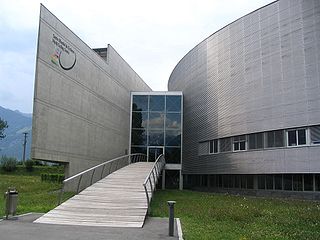
The Union Cycliste Internationale is the world governing body for sports cycling and oversees international competitive cycling events. The UCI is based in Aigle, Switzerland.
Cycle sport is competitive physical activity using bicycles. There are several categories of bicycle racing including road bicycle racing, cyclo-cross, mountain bike racing, track cycling, BMX, and cycle speedway. Non-racing cycling sports include artistic cycling, cycle polo, freestyle BMX, mountain bike trials, hardcourt bike polo and cycleball. The Union Cycliste Internationale (UCI) is the world governing body for cycling and international competitive cycling events. The International Human Powered Vehicle Association is the governing body for human-powered vehicles that imposes far fewer restrictions on their design than does the UCI. The UltraMarathon Cycling Association is the governing body for many ultra-distance cycling races.

Road bicycle racing is the cycle sport discipline of road cycling, held primarily on paved roads. Road racing is the most popular professional form of bicycle racing, in terms of numbers of competitors, events and spectators. The two most common competition formats are mass start events, where riders start simultaneously and race to a set finish point; and time trials, where individual riders or teams race a course alone against the clock. Stage races or "tours" take multiple days, and consist of several mass-start or time-trial stages ridden consecutively.

The classic cycle races are the most prestigious one-day professional road cycling races in the international calendar. Some of these events date back to the 19th century. They are normally held at roughly the same time each year. The five most revered races are often described as the cycling monuments.

The UCI Track Cycling World Championships are the set of world championship events for the various disciplines and distances in track cycling. They are regulated by the Union Cycliste Internationale. Before 1900, they were administered by the UCI's predecessor, the International Cycling Association (ICA).

The UCI World Championships are annual competitions promoted by the Union Cycliste Internationale (UCI) to determine world champion cyclists. They are held in several different styles of racing, in a different country each year. Championship winners wear a white jersey with coloured bands around the chest for the following year. The similarity to the colours of a rainbow gives them the colloquial name of "the rainbow jersey." The first three individuals or teams in each championship win gold, silver and bronze medals. Former world champions are allowed to wear a trim to their collar and sleeves in the same pattern as the rainbow jersey.
The International Cycling Association (ICA) was the first international body for cycle racing. Founded by Henry Sturmey in 1892 to establish a common definition of amateurism and to organise world championships its role was taken over by the Union Cycliste Internationale (UCI) in 1900.
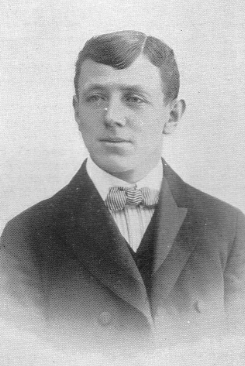
Jimmy Michael was a Welsh world cycling champion and one of the top riders in the sport for several years.
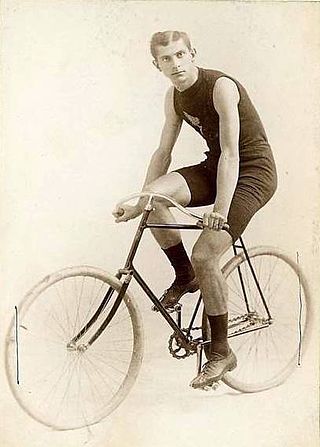
Arthur Augustus Zimmerman was one of the world's great cycling sprint riders and winner of the first world championship in 1893. His prizes as an amateur were a consideration in the establishment of the International Cycling Association (ICA).

The European Track Cycling Championships are a set of elite level competition events held annually for the various disciplines and distances in track cycling, exclusively for European cyclists, and regulated by the European Cycling Union (UEC). They were first held in their current format in 2010, when elite level cyclists competed for the first time following an overhaul of European track cycling.
Revolution was a series of track cycling events primarily held at the Manchester Velodrome in the north west of England. It was solely held in Manchester between 2003 and 2012. From Season 10 (2012–2013), meetings were additionally held at the new UK velodromes; in the Sir Chris Hoy Velodrome in Glasgow, the Olympic Velodrome in London from Season 11 (2013–2014), and the Derby Arena from 2015 to 2016.
Charles Frédérick Barden (1874–1962) was a British cyclist. He placed second in the UCI Track Cycling World Championships men's sprint in 1896 and 1897. He held the English cycling title among other records. He was accused of dangerous riding among his colleagues. His career was ruined after the death of a fellow rider allegedly due to his negligence.
Season 1 of the Revolution cycling series was held during the winter track cycling season of 2003/2004.

Motor-paced racing and motor-paced cycling refer to cycling behind a pacer in a car or more usually on a motorcycle. The cyclist follows as close as they can to benefit from the slipstream of their pacer. The first paced races were behind other cyclists, sometimes as many as five riders on the same tandem. Bordeaux-Paris and record attempts have been ridden behind cars. More usually races or training are behind motorcycles.

The 1896 track cycling world championships were the fourth world championships for track cycling. They took place in Copenhagen, Denmark. There were four events: separate amateur and professional races in both the sprint and the stayers' race (motor-paced).
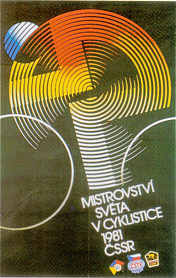
The 1981 UCI Track Cycling World Championships were the World Championship for track cycling. They took place in Brno, Czechoslovakia in 1981. Fourteen events were contested, 12 for men and 2 for women.
The 1900 UCI Track Cycling World Championships were the World Championship for track cycling. They took place in Paris, France from 12 to 18 August 1900. Four events for men were contested, two for professionals and two for amateurs. Apart from the four events a tandem event was organized. This race has never been officially recognized. The Dutch duo Harrie Meyers-Fernando Tomaselli won ahead of the French duo Edmond Jacquelin-Lucien Louvet and the French-American duo Charles Vanoni-Robert Protin. Because the race was not official the medalists are not listed in the list of Tandem World Champions.
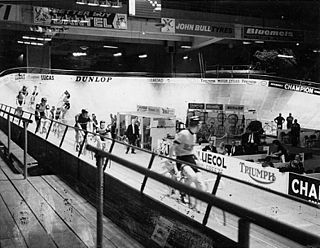
The Six Day London is a six-day track cycling race held annually in London, United Kingdom. The competition consists of six consecutive evening sessions of track cycling: Madison, Sprint, Elimination, Keirin, Derny and Team Time Trial disciplines. Six day invites the world's elite Men's and Women's riders, as well as sprinters and emerging talent from around the world. The overall winner is the team which takes the most laps.













